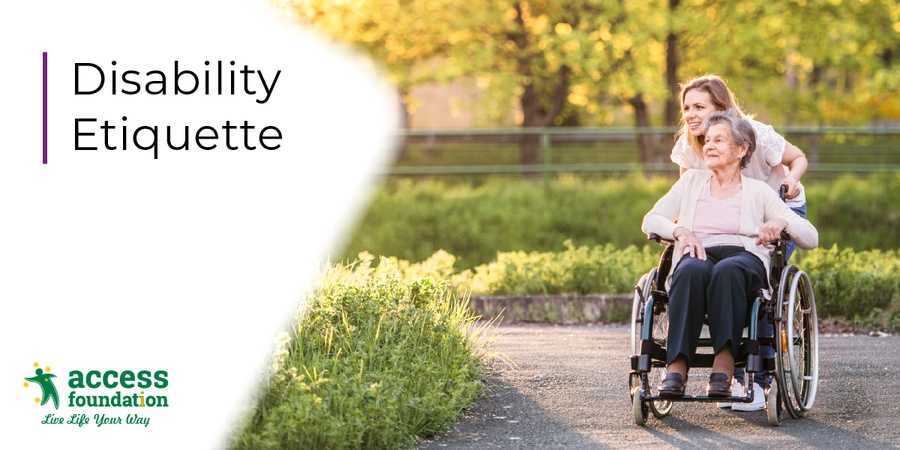
Disability Etiquette- How to Treat and Respect People with Disabilities?
The word "Etiquette" represents your upbringing. People won't remember your educational background, your wealth but your behavior, kindness, and wisdom you share with them. It is okay to have awkward hindrances upon interacting with people with disabilities. You might get confused over your body posture, topics, eye contact, etc. All these are normal as you are not interacting with them regularly. But, whenever you do, make sure to follow a few general etiquettes.
Learning the proper way to behave and speak around people with disabilities is essential if you often talk with them. Sometimes, you might upset the people with disabilities as your behavior might seem disrespectful to them even when you don’t have any such intention. Like every other person, people with disabilities deserve to be treated with respect and dignity.
It would be best if you had a sense of disability awareness and etiquette in mind so that the person with a disability doesn’t feel disrespectful in any way.
In this blog, we have enlisted some disability etiquette tips that you might find helpful!
-
Find commonalities and not differences
Common grounds are the base of all human connections, and when you find something familiar with them, you can deal with the differences. Everyone likes to be treated with equality, and therefore, make sure to make them feel comfortable in your presence rather than making them feel different because of their physical disability.
-
Don’t feel pity for them
Whenever you interact with a person with a disability, make sure not to feel pitiful for them. Most people with disabilities don’t like it when people feel sorry for their disability. Be normal around them and don’t assume that they see their disability as a tragedy. You should never use words like “I am sorry that happened with you” with a person with a disability because this can instantly make them feel sad and sorry.
-
Never try to avoid someone with a disability
We often find it intimidating to converse and interact with people with disabilities, but it isn’t as tricky if you know how to behave around them. It would be best to make eye contact while communicating and not avoid them during a conversation. Not having eye contact might make them feel ignored.
People often ignore people with disabilities because they fear they will unintentionally say something disrespectful to them but ignoring the person will not help. Just be normal around them, talk with them like you speak with everyone else.
-
Don’t use offensive terms and derogatory statements
People often use offensive terms that might hurt other people. It would be best to be extra careful while talking with a person with a disability. Some names and phrases have become so common in our culture that they don’t seem offensive, but that doesn’t mean you can use these terms all the time. A disabled person might take these terms personally and get offended. Respect people with disabilities and don’t let them feel wrong about their disability. Be polite and treat them with kindness!
-
Kindness Above All
In a world full of rude people with derogatory manners, being kind is the need of the hour and treating disabled people with kindness is the best thing you can do. Be kind to them and make them feel positive in your presence. Help them if needed but don’t try to accommodate every last need of someone to be respectful. Just be polite and ask them if they need any help, don’t overdo anything.
-
Don’t Hesitate While Asking Question
When you are interacting with a disabled person, talk with them freely. Don’t make any assumptions about them or their disability because you can get yourself in trouble. Beliefs can be wrong sometimes and can lead to stereotypes and offensive comments. Instead, ask them appropriate questions, and if they don’t find it comfortable to answer, don’t force them because disability can be personal, and they might not be ready to talk about it yet.
-
Let them be themselves
Some disabled people behave differently, and it might seem strange to you, but you shouldn’t point it out to them. Even if you don’t know about their doings, instead of asking them or pointing it out, it’s better just to let it be. The more you give them their space and let them be themselves, the more they will trust you and become friendly with you.
So, the above are a few key points that we found valuable and worth sharing. Hopefully, you will find it helpful and start working on the improvement.
-
Keep It Simple & Precise
People with disabilities are people first! The sooner we realize this simple thing and put it into our conscious minds, the better we start to behave with them. People with disabilities don't seek your extra effort or sympathy; they want to be treated well. They got more attracted to you when you started listening to them. So, whenever you meet a person with disabilities, ensure talking with them more humanly as you do with your loved ones.
How can Access Foundation help people with disabilities?
Access Foundation is a disability service provider in West Australia providing quality disability services and assisting people with disabilities in living an independent life. Apart from helping the people with NDIS funds and fulfilling goals, we also help them become more social and active in the community. We allow them to interact with people and engage with others in society. We help them become confident and live life without any barriers.
If you or any disabled person in your family requires disability support, you can contact us.

